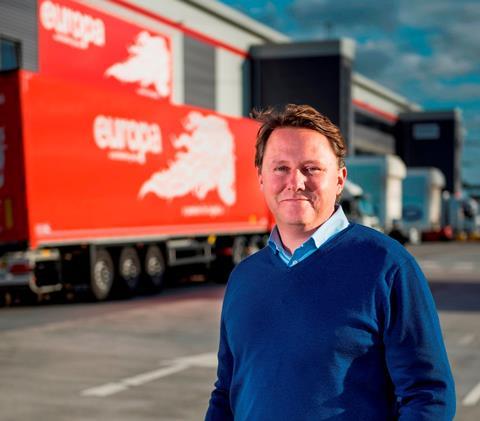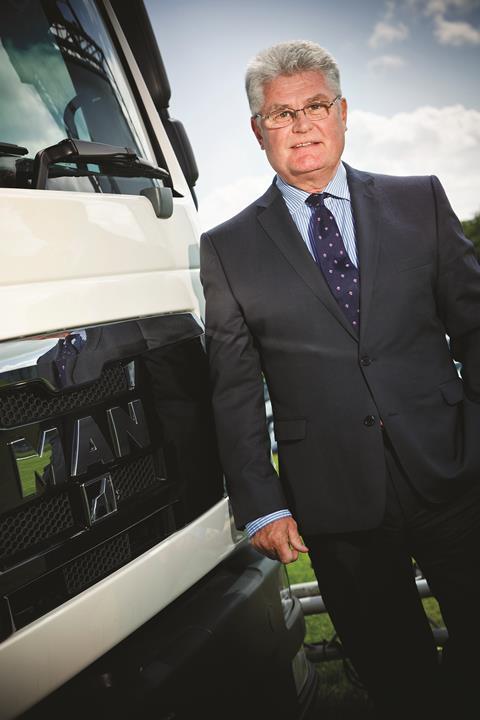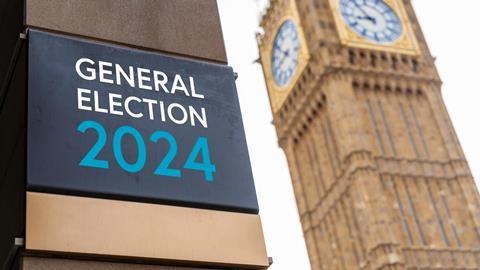Key figures from the road transport sector tell us what they’d like to see happen once the General Election is done and dusted

Andrew Baxter, chief executive, Europa Worldwide Group
If the government wants net zero, we need trucks that are net zero. We cannot be net zero transport companies unless there are net zero trucks. And they had better be economical, otherwise you’ll inflict a lot of damage on the UK economy.
There are two principal things that the government needs to do for UK (transport or other) businesses to flourish – stop putting up business taxes and introduce more flexible employment laws.
In my view, British businesses, and even more significantly the state sector, are hampered enormously by overprotective employment law. If you want a more dynamic, productive and high growth economy, the government needs to make it easier for businesses to adjust and let go of non-productive employees. Sadly, Labour will damage, not help in either regard, which will lead to a weaker economy and a poorer Britain.
My main cause for concern, is the ramifications of this country lurching to the left. Higher taxes, more complex employment legislation and a more regulated economy will certainly make Britain and the British worse off.
In terms of investment, policy changes etc, well, if they could invest in our road infrastructure that would be good, but sadly, that won’t be the Labour priority.
What worries me most is that after eight years of working on optimising customs processes, Labour will seek to put us back in the customs union. Which would be a democratic outrage as well as having wasted a huge amount of time and money for those in the international freight sector.
A Labour government, particularly with a large majority will be a disaster for this country and every business in it. Whilst people may be frustrated with the conservatives, voting in the hardest left government since the 1970s is not the answer. I feel sad about the negative outlook that this will have for our country.

Andrew Malcolm MBE, chief executive, Malcolm Group
Firstly we need to get the transport minister’s role seen as a key cabinet role and not just a stepping stone to a greater position. We need a minister for logistics. We have zero consistency with ministers and they have no understanding of our markets. Politicians make it harder for the logistics sector to remain financially viable as they over-regulate us. Longer semi-trailers are one example. The pace of cost effective and resilient options on decarbonisation is challenging to say the least, as are the options of disposing of second hand trucks.

Des Evans, author and transport consultant
If the next government seeks to be the ‘wealth creator’ then it needs to make sure that the UK transport industry can rise to the challenge of increased demand and deliveries made on time.
If you read the the latest transport news, however, rising costs, reduced profitability and increased insolvencies are just three of the many challenges facing us and without a functioning transport industry wealth creation objectives will be very difficult to achieve.
There are, however, three areas where more focused government and industry collaboration could help improve the current situation. Net zero, decarbonisation and fuel costs are at the heart of this discussion.
For the HGV sector the prospect of replacing the internal combustion engine with BEVs, although desirable is currently not economically viable. The three areas to focus on that will help operators achieve their net-zero and decarbonisation goals are as follows.
1. An HGV scrappage scheme: A focused programme to scrap 10,000 Euro-5 or older 38/44 tonne tractor units. A £10,000 grant for each unit scrapped. Total cost £100m.
2. A Euro-6 used vehicle programme: Using the £100m grant for scrapping 10,000 10-year-old + 10,000 2/3-year-old Euro-6 used vehicles qualify for the grant which will give a boost to the UK used vehicle sector.
3. HGV driver recruitment: Instead of giving university students loans of £9,250 for annual tuition fees, provide a £3000 grant to train 10,000 new HGV drivers. Cost £30m.
In order to fund these three proposals the government could allocate 1% of the £10bn they raise in annual tax from the oil companies. This will provide the £100m needed for the scrappage scheme and the used vehicle programme.
In addition the government needs to recognise that the UK logistics sector contributes £5bn in tax revenue from fuel and vehicle excise duty whilst generating £163bn in gross value added (GVA) per annum so this sort of grant allocation is self-financing.

Bob Terris, chairman, Meachers Global Logistics
The whole country is completely disillusioned with politicians of all parties, and this also applies to many politicians when you consider the number of current MPs which will not be standing again in the upcoming election.
Anyone with any knowledge of how the country functions will know that many of the problems are caused by the failure of the civil service to run government departments in a proper and efficient manner. It is obvious that many politicians are being undermined by the people they are supposed to be directing.
I do appreciate that the current government have been very unfortunate in having to deal with the Covid pandemic and the Brexit situation and the effect of both these events will affect the UK for many years to come
They have, however, shot themselves in the foot by the constant in-fighting and back stabbing which does not instil confidence in their ability to run the country.
Then we have the present opposition which seem reluctant to divulge any sort of financial details on how they will fund the changes they are proposing. So overall a pretty dismal situation which will take some time to improve.
As far as our industry is concerned we have many of the problems that all industries have plus a few which are more specific.
The rising number of company failures with reducing margins and high interest rates are clearly causing real problems for some. Additionally the increase in corporation tax to 25% will mean that continuing businesses will have less to reinvest in the future at the same time as the capital cost of new equipment is rising to unprecedented levels. And this is without the added cost to achieve net zero.
Any new government will have a large number of issues to address but for our industry we would like to see priority given to road network maintenance and improvement and more urgency given to the creation of a structure to support vehicle electrification. I’d also like to see more financial support for changing to electric or alternative fuel vehicles and the training levy replaced with something that works for our industry.

Moreton Culimore, owner/MD of Moreton C Cullimore
The next government needs to:
- Change the national planning framework to allow for and include more safe and secure welfare and parking spaces across the UK, particularly in permitted developments not just in isolation.
- Create pathways into the industry, not just in driver encouragement and training but for HGV mechanics in particular. As technologies change, emphasis and pressure on quality trained maintenance and mechanics will become even more of a priority and there is a huge shortage of mechanics and technicians across the country. Unfortunately our industry can’t ‘work from home’ and without people wanting to do these roles this industry can’t live in this heavily regulated world.
- Stop this anti-lorry blockading and re-routing of A road network. Where roads are wide enough and of good construction they should be used to allow the arteries of our network to flow.
- Increase the government’s understanding of how this industry works and its needs. And better understand that the electrification may work in major parts of our industry but it does not and cannot work in construction and heavy haulage related vehicles.

Charlie Shiels, chief executive, ArrowXL
Whilst I understand and applaud the specific industry agenda from the RHA & Logistics UK, my thoughts and needs are also focused on UK PLC as a whole.
The Logistics world provides a service for UK PLC. When it suffers we suffer, and at the moment we are all suffering.
ArrowXL services the retail industry (high street and digital), therefore economic stability and sustainable growth are top of our agenda. We’ve been knocked sideways with one crisis after another for the last 10 plus years and need a nice long ‘disruption free period’ of economic growth. We need to make the UK a global powerhouse and take advantage of Brexit, now it has happened.
The government needs to get interest rates down, keep inflation down and ease the tax burden. They also need to address crime and sort out the apprentice levy to help bridge the skills gap. Not just drivers and mechanics, but skilled labourers (plumbers, builders, electricians etc).
If the next government is serious about making a big impact quickly to energise and engage many areas of the sector then focusing and collaborating on these 3 issues will, in my opinion, go a long way to ensuring such a goal is achieved.

Kevin Buchanan, chief executive, Pall-Ex Group
My big concern for both the country and our sector moving forward is the lack of available people to fill the roles we need for companies to operate and grow.
In our sector we have had no investment by any government in more than 50 years. Every political party claim to want to reduce unemployment, but they don’t seem to be connected to the sectors who have vacant positions and the need to help train people in roles in which they could make a valuable contribution to society.
We like many companies are working hard with local schools and colleges to increase awareness of the great opportunities the sector can offer but with government focus and support so much more could be done. The country’s economy can’t grow with the skills and people shortages we have, and this is a key challenge which must be addressed by the next government.














